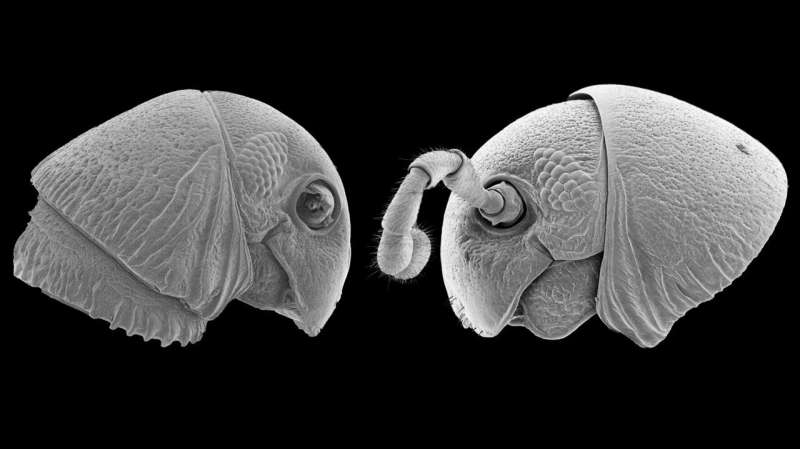This article has been reviewed according to Science X's editorial process and policies. Editors have highlighted the following attributes while ensuring the content's credibility:
fact-checked
trusted source
proofread
New genus of 'alien-faced' multi-legged forest dwellers discovered

University of the Sunshine Coast researchers have uncovered a new genus and five new species of millipedes in remote African jungles—and say the many-legged creatures could hold important clues to whether woody vines are choking or protecting the world's forests.
UniSC Professor Andy Marshall said they found the millipedes—with heads that look somewhat like Star Wars characters—among forest litter and loose soil while researching tree and vine growth in the Tanzania's remote Udzungwa Mountains.
The new genus and species were officially described recently in the European Journal of Taxonomy in a paper titled "A mountain of millipedes XI. The trachystreptoform spirostreptids of the Udzungwa Mountains, Tanzania (Diplopoda, Spirostreptida, Spirostreptidae)," with six international collaborators including lead author Professor Henrik Enghoff of the University of Copenhagen.
"The millipedes will help us to determine two very different theories on the role of vines on forest recovery—whether the vines are like bandages protecting a wound or 'parasitoids' choking the forest," Marshall said.
"We record millipedes of all sizes during our fieldwork to measure forest recovery because they are great indicators of forest health, but we didn't realize the significance of these species until the myriapodologists had assessed our specimens," Marshall added. "It's remarkable that so many of these new species did not appear in earlier collecting of millipedes from the same area, but we were still hoping for something new."
Marshall and Ph.D. student Alain Ngute from UniSC's Forests Research Institute found the new millipedes while conducting the research in Tanzania as part of Forest Restoration and Climate Change Experiment.
Recent findings, part of a global research collaboration, suggest that warmer temperatures are a key driver in woody vines taking over the forests already disturbed by logging and other impacts.
Known for their multitude of legs, the largest African millipedes can grow up to 35 centimeters.
Marshall, from UniSC's Forest Research Institute, explained that while the millipedes they found were only a few centimeters long, they still had about 200 legs each.
It is not the first time Marshall has had the thrill of discovering new species during his research; his previous finds include a new chameleon and new species of tree that could already be on its way toward extinction. He said unearthing the new genus and species of millipedes highlighted the huge amount of discovery remaining in tropical forests.
Professor Enghoff and the team named one of the new species Lophostreptus magombera after the Magombera Nature Reserve, a biologically unique forest that Marshall has been working to conserve since the turn of the millennium.
The millipede specimens are now in Denmark's Natural History Museum at the University of Copenhagen.
The new genus is Udzungwastreptus. The five new species are Lophostreptus magombera; Attemsostreptus cataractae; Attemsostreptus leptoptilos; Attemsostreptus julostriatus and Udzungwastreptus marianae.
More information: Henrik Enghoff et al, A mountain of millipedes XI. The trachystreptoform spirostreptids of the Udzungwa Mountains, Tanzania (Diplopoda, Spirostreptida, Spirostreptidae), European Journal of Taxonomy (2024). DOI: 10.5852/ejt.2024.918.2405
Provided by University of the Sunshine Coast



















